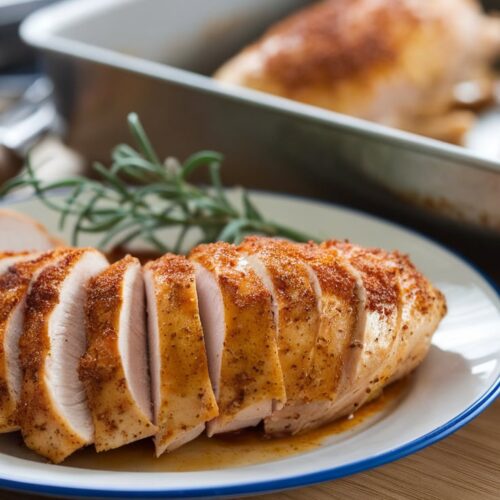
boneless chicken breast recipe
This Boneless Chicken Breast recipe ensures juicy, flavorful chicken every time with a simple parchment paper hack that locks in moisture. It's an easy, versatile dish that's perfect for weeknight dinners or meal prep, and can be customized with your favorite seasonings. Get ready to enjoy perfectly cooked chicken with minimal effort!
Equipment
- 1 Skillet or Frying Pan 10-12 inches in diameter
- 1 Tongs
- 1 Parchment paper sheet large enough to cover the chicken breasts in the pan
- 1 Meat Thermometer optional but highly recommended for precise cooking
- 1-2 sheets Paper Towels for drying the chicken before cooking
Ingredients
- 4 pieces Boneless, Skinless Chicken Breasts
- 2 tablespoons Olive Oil or your preferred cooking oil
- 1/2 teaspoon Salt or to taste
- 1/4 teaspoon Black Pepper or to taste
- 1/2 teaspoon Optional Seasonings Garlic Powder, Paprika, Thyme, etc.
Instructions
Prepare the Chicken :
- Pat the boneless chicken breasts dry with paper towels to remove any excess moisture. This helps the chicken to sear properly, creating a crispy exterior.
- Season both sides of the chicken breasts generously with salt, pepper, and any additional spices or herbs you prefer (such as garlic powder, paprika, or thyme).
Prepare the Skillet :
- Heat 2 tablespoons of olive oil (or your preferred cooking oil) in a large skillet over medium heat. Allow the oil to heat up for about 1-2 minutes until it shimmers.
Cook the Chicken:
- Once the oil is hot, place the seasoned chicken breasts in the skillet. For best results, avoid overcrowding the pan; you may need to cook the chicken in batches depending on the size of your skillet.
- Cook the chicken for about 6-7 minutes on the first side until golden brown. Then, flip the chicken breasts using tongs and cook for an additional 5-7 minutes on the other side.
- If you want to ensure that the chicken is cooked through, use a meat thermometer to check the internal temperature. It should read 165°F (74°C).
Rest the Chicken :
- Once the chicken is fully cooked, remove it from the skillet and place it on a cutting board or plate. Let the chicken rest for 5 minutes before slicing. This allows the juices to redistribute and ensures the chicken stays tender and juicy.
Serve :
- Slice the chicken breasts against the grain and serve with your favorite side dishes, such as roasted vegetables, mashed potatoes, or a salad.
Video
Notes
- Chicken Thickness: If your chicken breasts are particularly thick, you might want to consider butterflying them (cutting them in half horizontally) or pounding them with a meat mallet to ensure even cooking. This will help the chicken cook faster and more evenly.
- Cooking Time: Keep an eye on the chicken while it's cooking. Overcooking can lead to dryness, so it's best to use a meat thermometer to ensure the chicken reaches an internal temperature of 165°F (74°C). This guarantees the chicken is safe to eat and still juicy.
- Resting the Chicken: After cooking, always let your chicken rest for at least 5 minutes. This allows the juices to redistribute throughout the meat, preventing it from drying out when you cut into it.
- Seasoning Variations: Feel free to customize the seasoning based on your preferences. You can add garlic powder, paprika, cayenne pepper, or fresh herbs like rosemary or thyme for extra flavor.
- Oil Substitutes: If you don't want to use olive oil, you can substitute with vegetable oil, avocado oil, or even butter for a richer flavor. Keep in mind that this may change the calorie count slightly.
- Serving Suggestions: This recipe pairs well with a variety of sides such as roasted vegetables, mashed potatoes, quinoa, or a fresh salad. It’s a versatile dish that can fit many meal plans and cuisines.